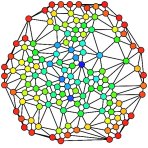What is a Networked Community of Practice
Communities of practice (Wenger, 1999) are thriving and being sustained by technological environments constructed by community members to scaffold work and learning (Wenger, White, & Smith, 2009). For the context of this research, we define a networked community of practice as a group of individuals who utilize digital tools, such as social media, websites, blogs, and other online collaborative spaces, for the purposes of building professional networks, contributing to formal/informal learning, enhancing personal growth, or being a member of a knowledge-sharing community.
We draw on the definition of “networks” and “communities” from Wenger-Traynor:

Networks are relationships, personal interactions, and connections among individuals who share information, helpful resources, and contribute to personal/professional growth. For the purpose of our study, networks include relationships, interactions, and connections specifically facilitated in a digital environment.

A community is a group of individuals who represent a shared identity around a topic, intentional focus, or collective goal. For the purpose of our study, a community might be part of a personal learning network, formal OR informal organization, or a group of people who establishes and sustains participation and interactions by using digital tools and/or social media platforms.
To further this, we are interested in learning how practitioners in higher education are creating their professional identity in networked communities, that is, determining what to share, how to interact, how to engage, and how what they share influences their sense of professional identity. Also, to understand how professional identity and networked communities shapes professional practice.
Background
Today social, online platforms facilitate how we share, communicate, and connect with one another. Increasingly in higher education, we see higher education staff on social media to solicit advice, offer personal reflections, share resources, join in on a group discussion, participate in learning, and build professional relationships online. Academia is utilizing open, social technologies increasingly with the impact of digital scholarship (Weller, 2011), networked and digital practices (Veletsianos & Kimmons, 2016), participation influence online (Stewart, 2015), and disclosure of information online (Stewart & Veletsianos, 2016). Although we are beginning to understand the role of social networking sites among scholars (Jordan, 2014; Veletsianos, 2016), there is very little of research about how social media is being utilized by practitioners in higher education, particularly in the field of student affairs, student services, and administrative staff.
Digital tools and social technologies help us leverage what we do within our professional network and contribute to online communities — but what does this mean for higher education and student affairs? Thus, this research seeks to fill the gap in our understanding of HOW and WHY higher education practitioners utilize social media with regards to professional identity development and influence; digital, open practices; ethical digital engagement; and contributions to the networked community. Further, as digital networks, platforms, and tools consistently proliferate and shift (Gerber, Abrams, Curwood, & Magnifico, 2016), our research seeks to understand how higher education professionals make choices regarding:
- which online communities of practice to engage in;
- how participation within distributed;
- online ecologies impacts professional identity, practice, and influence; and
- how patterns of engagement and disengagement across social media platforms are conceptualized, practiced, enacted, and performed.
This study is created to explore how and why higher education professionals participate in online, connected communities, specifically targeting graduate students, professional staff, senior administrators, and scholar-practitioners post-secondary education engaging in networked experiences. We are interested in learning how practitioners and professionals use digital spaces and places for professional development, learning, and to establish a professional digital identity. As professionals continue to develop their networked selves and participate in online communities, we hope to understand the implications of how these social media and digital platforms both influence professional/personal identity development and contribute to practice in higher education.
Just a Few of the MANY Networked Communities of Practice in Higher Ed & Student Affairs include:
- Twitter Chats: #sachat, #highered, #sapro, #sagrad, #acadv, #sacdn, #acadv, etc.
- Facebook Groups: Student Affairs Professionals, #HigherEdSocial, #AdvTech, etc.
- Blogs: The SA Collective, The Student Affairs Feature, and the MANY individual bloggers in SA & Higher Ed!
- Podcasts/Videocasts: Higher Ed Live, The Student Affairs Spectacular Podcast; Relay SA; Research in Action, BreakDrink (archives), etc.
The examples above are not ALL there is. During the course of this study, we hope to learn about other networked communities that exist in higher education and student affairs.
We believe our study will directly examine the following ACPA/NASPA Professional Competencies [PDF], including these specific areas:
- Personal and Ethical Foundations (PPF) Intermediate: Analyze personal experiences for potential deeper learning and growth, and engage with others in reflective discussions.
- Organizational and Human Resources (OHR) Advanced: Develop or lead professional development initiatives that regularly assess the strength and weakness of professionals and provide them with purposeful opportunities to advance their skills and knowledge.
- Leadership (LEAD) Intermediate: Create environments that encourage others to view themselves as having the potential to make meaningful contributions to their communities and be civically engaged in their Communities.
- Technology Foundation (TECH) Intermediate: Proactively cultivate a digital identity, presence, and reputation for one’s self and by students that model appropriate online behavior and positive engagement with others in virtual communities.
It will also examine the following CACUSS Student Affairs and Services Competency Model, including these specific areas:
- Intercultural Fluency – Advanced: Consider opportunities for respectfully integrating diverse worldviews within a broader understanding of social sustainability and the work of SAS.
- Equity, Diversity, and Inclusion – Core: Identify systems of socialization that influence one’s multiple identities and sociopolitical perspectives and how they impact one’s lived experiences.
- Technology and Digital Engagement – Advanced: Contribute to, partner with, and/or provide leadership for local, provincial, national, and global digital professional learning communities and personal learning networks in promoting the use of technology for educational purposes.
References
Gerber, H. R., Abrams, S. S., Curwood, J. S., & Magnifico, A. M. (2016). Conducting qualitative research of learning in online spaces. Thousand Oaks, CA: Sage.
Jordan, K. (2014) Academics and their online networks: Exploring the role of academic social networking sites. First Monday, 19(11), http://dx.doi.org/10.5210/fm.v19i11.4937
Stewart, B. (2015). Open to influence: What counts as academic influence in scholarly networked Twitter participation. Learning, Media, and Technology, 40(3), 1-23. doi: 10.1080/17439884.2015.1015547
Veletsianos, G. (2016). Social Media in Academia: Networked Scholars. New York, NY: Routledge.
Veletsianos, G., & Kimmons, R. (2016). Scholars in an Increasingly Digital and Open World: How do Education Professors and Students use Twitter? The Internet and Higher Education, 30, 1-10.
Veletsianos, G. & Stewart, B. (2016). Scholars’ open practices: Selective and intentional self-disclosures and the reasons behind them. Social Media + Society, 2(3). doi: 10.1177/2056305116664222
Weller, M. (2011). The digital scholar: How technology is transforming scholarly practice. Bloomsbury Open Access. doi: 10.5040/9781849666275.
Wenger, E. (1999). Communities of practice: Learning, meaning and identity. Cambridge, UK: Cambridge University Press, Paperback Edition.
Wenger, E., White, N., & Smith, J. D. (2009). Digital habitats: Stewarding technology for communities. Portland, OR: CPSquare.